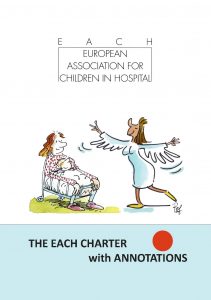
At Children’s Health Scotland we want every young person in Scotland to be supported in an appropriate and timeous way as they transition from paediatric child-centred services to adult-orientated healthcare systems. Our work is underpinned by the European Association for Children in Hospital (EACH Charter), which states the rights of children and young people in health care services, and their corresponding rights in the United Nations Convention on the Rights of the Child (UNCRC).
Transitions in healthcare describes the process by which young people move from paediatric child-centred services to adult-orientated healthcare systems. They require purposeful planning, as the move can be difficult and anxiety provoking in young people and their families. Transition Plans can ensure that young people with ongoing healthcare needs have the right adult service in place, once children’s services stop. As children and adult services are separate, and structured differently, young people and their families need to be aware of the different way of working and how to adapt to them. In some circumstances, there may be no equivalent adult service and support services, such as respite, may be more difficult to access.
The work of Children’s Health Scotland is underpinned by The European Association for Children in Hospital (The EACH Charter) which sets out ten standards describing how children and young people should expect to be treated in hospital, and what their rights are. The EACH Charter relates in many respects to the rights set out in the UNCRC; thus implementing one means implementing the other.
Currently hospitals in Scotland admit most children up to the age of 16, although there are exceptions in some cases of specialist services, and in some mental health units. Children’s Health Scotland regards it as unacceptable for age-appropriate care to be denied to any young person on the basis of lack of accommodation or inappropriately trained staff. We believe that health professionals providing care to children and young people in paediatric settings should be properly trained in the assessment of health needs of the different age groups.
Transitions in healthcare
Adult health services: Adult specialist teams should be encouraged to access Continuous Professional Development (CPD) on adolescent health. At least one member of each team should be supported to extend their knowledge and skills in supporting the mental health of young people, as this is an area of concern to young people and their carers and is likely to impact on their resilience in coping with transition to a new environment of care. It would be important that adult health services actively follow up young people who fail to attend, or are not adhering to treatment regimes after transition, given their developmental vulnerabilities and the long-term impact of not receiving treatment.
Coordinated care: Many children and young people with long-term chronic conditions have been seen and treated by specialists from several different specialties, while under the care of a paediatric team that coordinates the care. These members are known to the young person and their family and are available to support the family with contacts and reviews by others. In adult services, there is no generic standard of coordination around the individual with each specialty working separately, often with several multi-disciplinary teams seeing the same patient, who is expected to manage the demands of each team, including multiple appointments, prescriptions, medications, and monitoring requirements. For the young person, coping with the challenges of adolescence and this tsunami of change can be overwhelming, while parents and carers try to relinquish their responsibilities for implementing clinical management plans. Children’s Health Scotland suggests that the benefits of coordinated care for individuals with long-term chronic conditions in later years should be applied to young people in transition to adult health services. It may be helpful to consider the steps that have led to the LAC (Looked after Children) Director in every Health Board to hold responsibility for the healthcare of children and young people in and leaving care.
Education: Children’s Health Scotland emphasises the importance for young people of their right to access to education, both to minimise an adverse effect on their academic performance, but also on their social links and peer support. Every young person who has to be absent from education due to ill health must be offered access to support for learning both while in hospital or ill at home. Those with long-term conditions should also have access to appropriately trained career advisors to optimise their opportunities for employment and career progression.
We believe that all children and young people should be informed of their healthcare rights and supported to understand:
- How to look after their health, both physical and mental.
- Know what to do if they are unwell.
- Know how to access health services when they are needed.
NHS Health Boards: Each NHS Health Board should have a robust policy for the provision of healthcare for adolescents and those moving from paediatric to adult services. Health Boards should share knowledge and understanding to ease provision for those needing to travel in and out of the area for treatment.
Partnerships: Children’s Health Scotland welcomes the emphasis placed by the Chief Medical Officer on partnership medicine and the potential this offers for young people to make a smooth transition from paediatric to adult health services. For children and young people, the partnership involves parents or carers to a reducing degree as adolescence progresses. The expectation that the clinical care of the young person will change over the same period of adolescent development must be adapted to the wishes and needs of the young person and their family as well as the healthcare providers and facilities.
Physical activity: Wherever possible and appropriate, young people should be encouraged to see physical activity and exercise as an important element of health maintenance. When in hospital, their recovery can be enhanced, and long-term health improved by the inclusion of physical activity in their treatment plans. If this can be planned to provide social contact within an age-appropriate environment, then this may offer additional benefits.
Policies and procedures: Children’s Health Scotland asks for an executive member of each NHS Health Board to have responsibility for transition policies and procedures for young people with long-term chronic conditions and/ or complex disabilities. This senior role should have line management for those health professionals and advocates who are nominated as key workers for individual young people, with authority to ensure that the needs of the individual young person are considered in relation not only to age and maturity, but also the life events that may impact on their ability to cope with transfer of care at a specific time.
For children and young people with long-term chronic conditions, their healthcare from diagnosis is aimed at optimal health, with awareness that they are expected to require lifelong treatment and reviews. Adopting a self-management approach from the start helps children and young people to develop self-efficacy, which has been shown to reduce the risk for adolescents with chronic disease withdrawing from treatment programmes.
Transition planning: Children’s Health Scotland strongly supports the recommendations of the Principles of Good Transition, which recognises that transitions for young people can be particularly problematic especially for those with additional support needs. The Principles of Good Transition highlights the importance of person-centred approaches, co-ordination across services, and ongoing support and access to information. Transition should be planned from the time of diagnosis, with an agreed stepwise plan for transfer of services over the adolescent period, which includes a named transition key worker, agreed with the young person and their advocate. The key person should accompany the young person to the initial introduction to the adult team, to shared clinics for joint review, and to their initial adult service assessments where procedures may differ from the children’s service areas, and where the young person’s confidence may be threatened by the unfamiliar surroundings.
Children’s Health Scotland is committed in its current work to make significant contributions as the leading Scottish children’s health charity, and in collaboration with other relevant agencies, to reduce these barriers. We want to ensure that children and young people with health conditions, and/ or during times of illness, along with their families, including carers, are empowered in knowing their needs and rights to access appropriate services. We want transition from paediatric child-centred to adult-orientated healthcare systems to be purposefully and carefully planned, with the young person’s views, worries, concerns, and needs placed at the heart of any decision making. Through this, young people will be supported to understand the difference in adult support services, understand from whom, and where to access support, and how to adapt to them in an appropriate and timeous way.
